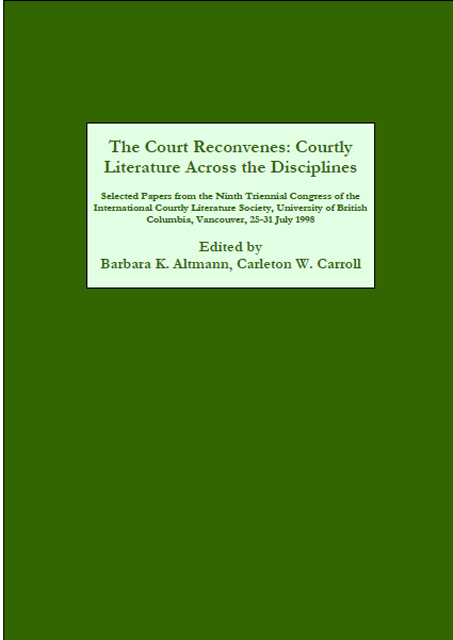 The Court Reconvenes
The Court Reconvenes “Dieus et amors sont d’un acort”: The Theology of Love in the Lai de l’Oiselet
Published online by Cambridge University Press: 31 March 2023
Summary
At first glance, the Lai de l’Oiselet, in the different versions it has come down to us, is a relatively unremarkable, if charming, fable-like tale. A little bird comes to sing every day in an enchanted garden, thereby perpetuating the miracle of its ever-temperate climate and fruitfulness. An unworthy vilain captures the bird, but releases it in exchange for three secrets, which turn out to be advice of a proverbial and somewhat commonplace nature. Having tricked its opponent, the bird flies away never to return, and the garden, deprived of its life-giving song, withers away.
The central character of the Lai, as in the sources from which it was derived, is the wondrous bird, whose voice vivifies the garden and is a source of wisdom to those who listen. The distinguishing factor of the Lai de l’Oiselet, however, is that the bird is an altogether more complex figure than in other versions of the tale, due to the extension of its role in a prologue to the original core of the narrative focussing on the “three truths” delivered to the boor. This prologue, which makes up about half of the Lai, provides information as to the origins of the garden and shows the bird addressing its visitors with words of moral advice. Before the battle of wits with the vilain, we therefore have a situation where the bird takes on the role of teacher, a positive expression of its position of authority vis-à-vis its listener(s).
The bird's initial message varies in length in the different manuscript versions of the Lai de l’Oiselet, but the nature of the wisdom imparted (expressed in direct speech) remains constant. It has three components. First, the message is presented as having a universal relevance, being addressed to
Et chevalier et clerc et lai,
Qui vos entremetez d’amors
Et qui en sentez les dolors (138–40)
(Knights, clerics and lay people, you who are concerned with love and feel its pain)
and to
… puceles,
Qui estes avenanz et beles,
Et le siecle volez avoir. (141–43)
(maidens who are attractive and beautiful and wish to possess this world.)
- Type
- Chapter
- Information
- The Court ReconvenesCourtly Literature across the Disciplines: Selected Papers from the Ninth Triennial Congress of the International Courtly Literature Society, University of British Columbia, Vancouver, 25-31 July 1998, pp. 91 - 98Publisher: Boydell & BrewerPrint publication year: 2002


